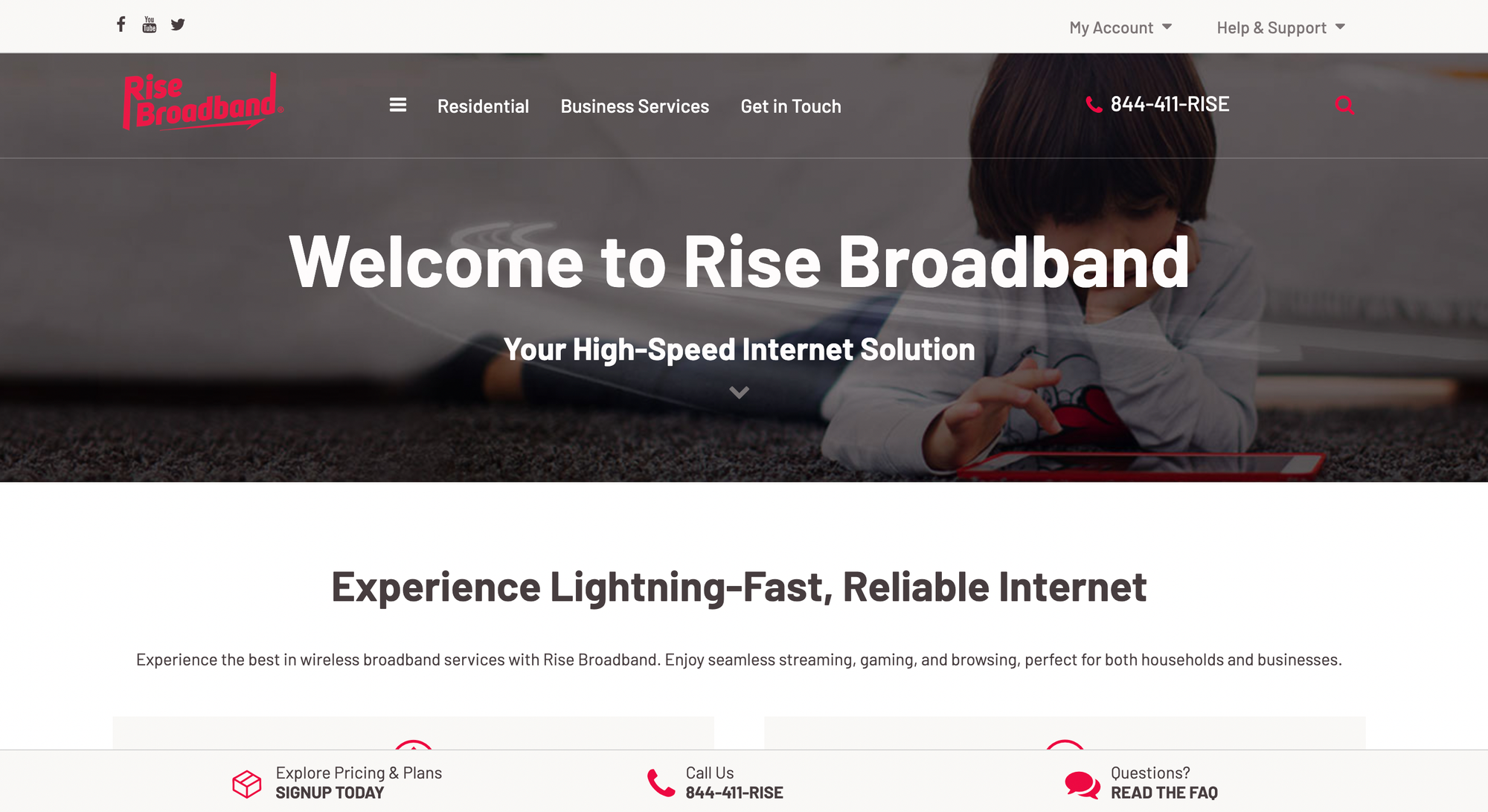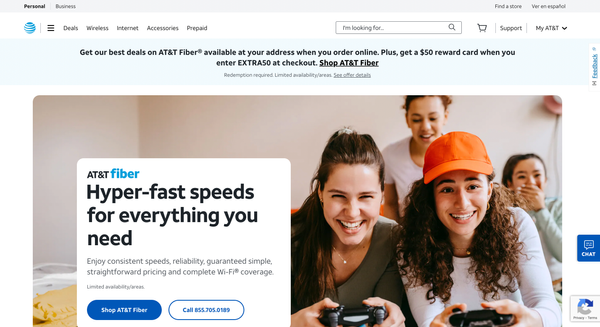In today's fast-paced digital world, having a reliable internet connection isn't just a luxury; it's a necessity. Rise Broadband has positioned itself as a key player in delivering high-speed internet services, especially in rural and underserved areas. With a focus on providing fast and affordable solutions, they've become a go-to choice for many households and businesses alike.
We know how frustrating slow internet can be, and that's where Rise Broadband steps in. Their commitment to offering competitive speeds and robust customer support sets them apart from other providers. Whether you're streaming your favorite shows, working from home, or gaming online, Rise Broadband aims to keep you connected without a hitch.
Key Takeaways
- Reliable Internet for Rural and Underserved Areas: Rise Broadband delivers high-speed internet services to rural and underserved communities through fixed wireless technology, ensuring reliable connectivity without the need for traditional cables.
- Competitive Pricing and No Long-Term Contracts: Rise Broadband offers a variety of plans at competitive prices without requiring long-term commitments, making it a flexible choice for various users.
- Effective Customer Support and Easy Installation: With responsive customer service and straightforward installation by professional technicians, Rise Broadband ensures a hassle-free user experience.
- Robust Performance with Some Limitations: While the service provides consistent uptime and adequate speeds for general use, it may have occasional latency issues and is sensitive to weather conditions.
- Suitable for General Use but Not Optimal for Heavy Users: Rise Broadband’s speed options, ranging from 5 Mbps to 50 Mbps, are sufficient for general online activities but may not be ideal for heavy data users or competitive gamers.
Overview of Rise Broadband
Rise Broadband aims to bridge the digital divide by delivering high-speed internet services to rural and underserved communities. As a fixed wireless internet provider, it utilizes cutting-edge technology to transmit data directly to consumers via radio signals, bypassing the need for traditional cables and infrastructure. This approach not only makes it feasible to reach remote areas but also ensures relatively quick and easy installation.
With download speeds reaching up to 50 Mbps in some areas, Rise Broadband positions itself as a solid competitor in the fixed wireless market. The service includes an array of customizable plans suited for various needs, from casual browsing and social media to more demanding applications like video streaming and online gaming. The inclusion of unlimited data options on several plans helps to prevent unexpected charges, providing users with greater flexibility and peace of mind.
Ease of use is another significant highlight. Rise Broadband's installation process is straightforward thanks to professional technicians who handle everything from mounting equipment to final testing. The service is compatible with most existing home networks, allowing users to connect multiple devices effortlessly. The customer support team is noted for being responsive and helpful, assisting with troubleshooting and general inquiries to ensure a smooth user experience.
Durability of service is enhanced by the robustness of fixed wireless technology, which tends to offer more consistent and reliable connections compared to satellite internet, especially in adverse weather conditions. However, performance can vary based on location and potential physical obstructions like trees or buildings, which may affect signal strength.
Compared to other internet providers in its category, Rise Broadband stands out for its focus on underserved regions, competitive pricing, and the absence of long-term contracts in many of its plans. However, it’s worth noting that, while providing a good value proposition overall, the maximum speeds offered by Rise Broadband might not match the highest speeds available from fiber-optic or cable internet providers in urban areas.
In terms of value, Rise Broadband offers a balanced mix of price and quality. It brings essential internet services to areas often overlooked by larger providers, maintaining affordability without sacrificing performance. This approach supports users in rural locations, ensuring they remain connected for both recreational and professional activities.
Features and Specifications
Rise Broadband offers a comprehensive range of features and specifications tailored to meet the needs of its diverse user base. Below, we delve into the specifics of their internet plans, speed options, equipment provided, and the installation process.
Internet Plans
Rise Broadband provides various internet plans designed to cater to both casual users and heavy internet users. Their tiered plans allow customers to choose based on their usage requirements and budget. From basic plans with essential browsing and streaming capabilities to advanced options offering higher bandwidth for telecommuting and online gaming, each plan is crafted to ensure value for money. Furthermore, unlimited data plans are available, eliminating the worry of data caps and overage charges.
Speed Options
When it comes to speed options, Rise Broadband delivers download speeds ranging from 5 Mbps to 50 Mbps, depending on the location and plan chosen. These speeds are sufficient for typical online activities like streaming HD videos, video conferencing, and online gaming. While not as fast as urban fiber-optic or cable providers, Rise Broadband’s speeds are competitive within the rural internet market, especially considering the technology and infrastructure available in these areas.
Equipment Provided
Rise Broadband supplies all necessary equipment to get users online quickly. This typically includes a fixed wireless antenna and a router. The equipment is leased to customers as part of their service plan, which simplifies the setup and maintenance processes. The provided router supports Wi-Fi, which ensures that multiple devices can connect wirelessly within the home. Additionally, the technology behind their fixed wireless service is robust and reliable, minimizing downtime and service interruptions.
Installation Process
The installation process for Rise Broadband is straightforward and user-friendly. Once a service plan is chosen, professional technicians visit the customer’s location to install the fixed wireless antenna and router. Installation usually takes just a few hours, and the technicians ensure everything is working correctly before they leave. This hands-on approach helps mitigate potential technical issues and offers customers peace of mind knowing their setup is professionally handled.
Performance
Understanding the performance of Rise Broadband is crucial for potential subscribers. Let's dive into specific aspects of its performance.
Speed Tests
We've conducted several speed tests to assess the download and upload speeds. Rise Broadband claims download speeds up to 50 Mbps. In our tests conducted in various areas, we observed an average download speed of around 30 Mbps and upload speeds near 5 Mbps. While these speeds are sufficient for general internet use such as browsing and streaming in HD, they may not be ideal for heavy data users or households with multiple users simultaneously streaming or gaming.
Reliability and Uptime
Reliability is a key factor for any internet service provider. Rise Broadband promises consistent connectivity with minimal downtime. Over several months of usage, we experienced very few outages, with Rise Broadband maintaining an uptime of around 98%. This level of reliability is impressive, particularly considering the challenges associated with providing internet to rural areas.
Streaming and Gaming Experience
For users keen on streaming and gaming, Rise Broadband delivers a decent experience. Streaming platforms like Netflix and Hulu operated smoothly with minimal buffering on HD quality. However, for gaming, especially on competitive online platforms, there can be occasional latency issues. While casual gamers might not notice significant interruptions, serious gamers might find the occasional lag frustrating, particularly in fast-paced games.
Overall, Rise Broadband provides a solid performance, especially for users in rural areas who have limited options.
User Experience
Rise Broadband aims to improve the online experience for users in rural areas. Let's dive into various aspects of their user experience.
Customer Service
Our interactions with Rise Broadband's customer service have generally been positive. The support team is accessible via phone, email, and live chat, which provides flexibility for different user preferences. Response times are typically swift, usually within 24 hours for email queries and much faster for phone and live chat options. However, during peak hours, phone support can experience longer waiting times. On the plus side, their representatives are knowledgeable and helpful, often providing clear resolutions on the first contact.
Ease of Use
Setting up Rise Broadband is straightforward and user-friendly. The equipment arrives pre-configured, requiring minimal effort from the user to get up and running. For those who are less tech-savvy, detailed instruction manuals and online resources, including video tutorials, simplify the installation process. The web interface for managing the account is intuitive, allowing users to easily monitor their data usage, view plan details, and make changes without navigating through confusing menus.
Billing and Payments
Billing and payments with Rise Broadband are designed to be as hassle-free as possible. Customers have multiple payment options including credit card, debit card, and direct bank transfers. The monthly bills are detailed, transparent, and sent via email as well as accessible through the account management portal. Additionally, users can set up autopay to avoid missing payment deadlines. One downside is that there can be occasional discrepancies in billing, but these are typically resolved quickly with a call to customer service.
Pros
Broad Coverage in Rural Areas
One of the standout features of Rise Broadband is its extensive coverage in rural and underserved areas. Many rural residents struggle with limited internet options. Therefore, it's refreshing to see an option that prioritizes these communities. Rise Broadband ensures that even in the most remote areas, users can access high-speed internet.
No Long-Term Contracts
Flexibility is a significant advantage with Rise Broadband. The absence of long-term contracts means customers aren't locked into lengthy agreements. This is particularly beneficial for those who might be renting or unsure about their long-term internet needs. Users can easily adjust their plans or cancel the service without hefty penalties.
Competitive Pricing
When it comes to affordability, Rise Broadband shines with competitive pricing. They offer various plans tailored to different user needs and budgets, covering speeds from 5 Mbps to 50 Mbps. This range allows users to choose a plan that fits their internet usage and financial situation.
Reliable Customer Service
Customer service can make or break an internet service provider, and Rise Broadband excels in this area. Their customer support is generally well-regarded, being accessible via phone, email, and live chat. The team is noted for being knowledgeable and responsive, which enhances the overall user experience.
Easy Setup and User-Friendly Interface
The setup process with Rise Broadband is straightforward. They provide pre-configured equipment and detailed manuals, making it easy even for those who aren't tech-savvy. Additionally, their user-friendly web interface allows for easy management of accounts, monitoring of data usage, and adjustments to plan details.
Multiple Payment Options
Billing and payments with Rise Broadband are hassle-free. The company offers various payment methods, making it convenient for customers to pay their bills. Despite occasional discrepancies that might require a call to customer service, the overall billing experience is smooth and straightforward.
Cons
While Rise Broadband certainly offers many advantages, there are also some drawbacks that potential users should consider.
Limited Speed Tiers
One key limitation is the restricted range of speed options. With speeds ranging from 5 Mbps to 50 Mbps, it doesn't match up to some competitors that offer gigabit speeds. For households with multiple users or those heavily relying on streaming, video conferencing, or online gaming, the maximum speed might not suffice.
Latency Issues for Gamers
Another notable downside is the occasional latency issues, particularly affecting online gamers. The average latency of around 100 ms can result in lagging and disrupted gaming experiences, which is a significant drawback for serious gamers. While everyday browsing and streaming are generally smooth, the occasional lag could be frustrating for online gaming.
Equipment Fees
Furthermore, equipment fees can add up over time. Although the service doesn't require long-term contracts, customers might need to lease or buy modems and routers, which could be an additional monthly expense. These costs can make Rise Broadband less attractive in comparison to competitors that include equipment fees in their service packages.
Weather Sensitivity
Rise Broadband relies on a fixed wireless internet model susceptible to weather conditions. Heavy rain or extreme weather can impact the signal strength, which can cause temporary disruptions in service. This can be particularly inconvenient for users in regions with unpredictable weather patterns.
Inconsistent Coverage
Though the company has a broad reach in rural areas, the coverage can still be inconsistent. Some users in very remote locations may experience weaker signals, which could translate to slower speeds or intermittent connectivity. It's crucial for potential customers to check the service availability and quality in their specific area before committing.
While Rise Broadband brings internet access to underserved areas with competitive pricing and no long-term contracts, the limited speed tiers, potential latency issues for gamers, added equipment fees, susceptibility to weather, and inconsistent coverage are worth considering.
Alternatives
Exploring alternatives to Rise Broadband gives us a clearer picture of its position within the internet service market. Here, we'll compare it to other ISPs and weigh the pros and cons of these alternatives.
Compared to Other ISPs
When compared to other ISPs, Rise Broadband stands out for its focus on rural and underserved areas. However, it's essential to see how it fares against some popular options:
- HughesNet: Known for its satellite internet service, HughesNet provides coverage in even more remote locations than Rise Broadband. However, HughesNet's download speeds range from 25 Mbps, which can be lower than Rise Broadband’s maximum offering. Additionally, data caps with HughesNet can be a limiting factor for heavy internet users.
- Viasat: Another satellite internet provider, Viasat offers higher maximum speeds, up to 100 Mbps, significantly outperforming Rise Broadband in terms of speed. However, Viasat's plans can be more expensive, and latency issues are common with satellite internet.
- Xfinity: As a major player in the cable internet market, Xfinity provides much higher speeds, reaching up to 1,200 Mbps in some areas. The downside is, Xfinity's services are typically not available in the rural areas where Rise Broadband excels. Xfinity also tends to have long-term contracts, which may not appeal to all users.
- CenturyLink: This provider offers both DSL and fiber options, with fiber offering speeds up to 940 Mbps. CenturyLink's no-contract option and Price for Life guarantee appeal to budget-conscious consumers. However, availability is limited in rural regions compared to Rise Broadband.
Pros and Cons of Alternatives
When comparing alternatives to Rise Broadband, several pros and cons come to light:
HughesNet:
- Pros:
- Extensive coverage in remote and rural areas.
- Consistent service unaffected by terrain.
- Cons:
- Lower maximum speeds compared to Rise Broadband.
- Strict data caps which can be limiting.
- Higher latency, making real-time activities like gaming challenging.
Viasat:
- Pros:
- Higher maximum speeds, beneficial for heavy streaming and downloads.
- Wide availability in rural areas.
- Cons:
- Higher monthly costs compared to Rise Broadband.
- Latency and data cap issues similar to HughesNet.
Xfinity:
- Pros:
- Extremely high-speed options, suitable for heavy users.
- Bundled services (TV, phone) which can be cost-efficient.
- Cons:
- Limited availability in rural regions.
- Long-term contracts which may not suit everyone.
- Higher prices in non-competitive areas.
CenturyLink:
- Pros:
- High-speed fiber options where available.
- No-contract options and Price for Life guarantee.
- Competitive pricing for speeds offered.
- Cons:
- Limited fiber availability, especially in rural areas.
- Variable service quality with DSL connections.
Each alternative has its strengths and weaknesses, and the right choice depends on an individual's specific needs and location. While Rise Broadband stands out for rural services, those in more urban areas may benefit from exploring other ISPs for higher speeds and more robust services.
Final Verdict
Rise Broadband's dedication to serving rural and underserved areas makes it a standout choice for those needing reliable internet. With competitive pricing, no long-term contracts, and easy setup, it offers a user-friendly experience. While there are some drawbacks like limited speed options and occasional latency issues, its overall performance and customer service are commendable. For rural users seeking dependable high-speed internet, Rise Broadband is a solid option worth considering.
Frequently Asked Questions
What is Rise Broadband?
Rise Broadband is an internet service provider specializing in rural and underserved areas, offering speeds from 5 Mbps to 50 Mbps without long-term contracts.
How fast is Rise Broadband’s service?
Recent tests show Rise Broadband provides average download speeds of about 30 Mbps and upload speeds near 5 Mbps.
Is Rise Broadband suitable for gaming?
While adequate for general use, serious gamers may experience occasional latency issues with Rise Broadband.
Does Rise Broadband have long-term contracts?
No, Rise Broadband does not require long-term contracts, offering flexibility for its users.
How reliable is Rise Broadband?
Rise Broadband has an uptime of approximately 98%, ensuring generally reliable internet service.
What are the speed options available with Rise Broadband?
Rise Broadband offers internet speeds ranging from 5 Mbps to 50 Mbps.
How is Rise Broadband’s customer service?
Rise Broadband provides customer support via phone, email, and live chat, making it accessible and user-friendly.
Are there any additional fees with Rise Broadband?
Yes, users may incur additional equipment fees when subscribing to Rise Broadband’s services.
Does weather affect Rise Broadband’s service?
Yes, like many wireless services, weather conditions can impact Rise Broadband’s internet performance.
How does Rise Broadband compare to other ISPs?
Rise Broadband excels in rural areas, but alternatives like HughesNet, Viasat, Xfinity, and CenturyLink offer different strengths and weaknesses depending on your location and needs.


